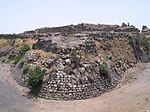The Island of Peace massacre was a high-profile shooting attack that took place on 13 March 1997, when a Jordanian soldier opened fire on a group of young Israeli schoolgirls and their teacher at the Island of Peace. Seven of the girls were killed, while five more and the teacher were injured; all of the girls in the group were aged 13–14. The perpetrator of the attack was Ahmad Daqamseh, a corporal serving in the Royal Jordanian Army. He had been stationed at the international border between Jordan and Israel, and encountered the girls while they were visiting Jordan's Island of Peace as part of a field trip from their AMIT school in the city of Beit Shemesh. Shortly after the attack began, Daqamseh's M16 rifle jammed and he was subdued by nearby Jordanian soldiers, who then rushed to help the victims.
Daqamseh was arrested and later diagnosed with antisocial personality disorder by a Jordanian medical team. He was tried and convicted by a five-member military tribunal, which sentenced him to 20 years in prison with hard labour.
Shortly after the attack, Jordanian king Hussein bin Talal personally visited the families of the victims and offered his condolences. His trip was seen as a sincere and unusual act in the history of the Arab–Israeli conflict, deeply moving the mourning Israeli public and helping to further improve the relationship between the two countries in light of the 1994 Israel–Jordan peace treaty.
Several Jordanians reacted positively to the attack; Daqamseh was called a "hero" by Jordanian politician Hussein Mjalli, and in 2013, a petition began to circulate in the Parliament of Jordan, as the overwhelming majority of MPs (110/120) alleged that he had finished his sentence and advocated his release. Nonetheless, Daqamseh served his sentence in full, being released on 12 March 2017. His family expressed pride for his actions and Daqamseh himself showed no signs of remorse, having told Jordanian interrogators in prison that he would have killed all of the girls had his M16 not jammed halfway through.










